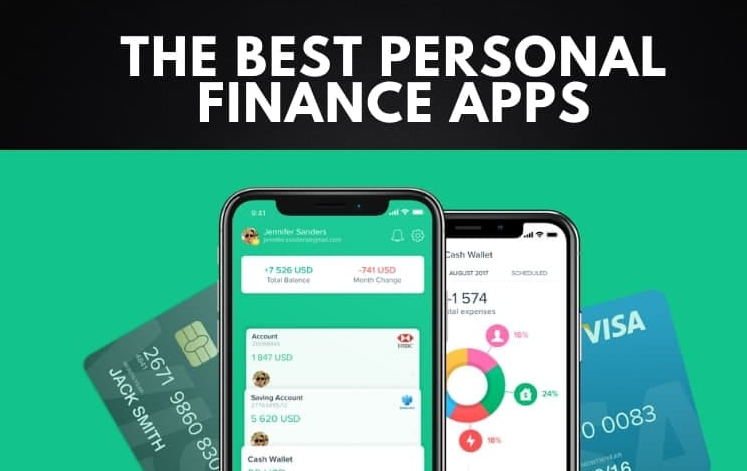Managing personal finances effectively is crucial for achieving financial stability and security. With the rise of digital technology, personal finance apps have become an essential tool for individuals to track, manage, and optimize their financial resources.
In this post, we’ll explore the best personal finance apps of 2024, highlighting their features, benefits, and drawbacks to help you make an informed decision.
Skale Money Key Takeaways
- Essential Features to Look For: When choosing a personal finance app, prioritize budgeting and tracking capabilities, investment and savings options, robust security measures, an intuitive user interface, and reliable customer support.
- Diverse App Options: The top personal finance apps of 2024 cater to different financial needs, from investment-focused apps like Robinhood and Stash to budgeting tools like YNAB and PocketGuard, each offering unique features and benefits.
- Investment and Savings Tools: Apps like Personal Capital and Acorns provide comprehensive tools for tracking investments and optimizing savings, helping users grow their wealth and plan for long-term financial security.
- User Experience and Support: Apps with user-friendly interfaces, such as Simplifi by Quicken, ensure easy navigation and regular use, while those offering strong customer support and positive reviews, like Personal Capital, enhance user confidence and satisfaction.
- Tailored Solutions: Specialized apps like Tiller for spreadsheet enthusiasts and Wally for straightforward expense tracking and budgeting, show the variety of options available to meet specific financial management preferences and needs.
Table of Contents
What to Look for in a Personal Finance App
When selecting a personal finance app, it’s essential to consider the following key features:
Budgeting and Tracking Capabilities
A good personal finance app should provide robust budgeting tools to help you create and stick to a budget. Look for features like:
- Automatic categorization of expenses
- Ability to set spending limits per category
- Real-time tracking of income and expenses
- Customizable budget templates
Having these budgeting capabilities allows you to gain a clear understanding of your spending patterns and make informed decisions about where to cut back or allocate more funds.
Investment and Savings Options
If you want to grow your wealth through investing or saving, choose an app that offers features like:
- Tracking of investment accounts and portfolios
- Retirement planning calculators
- Automatic savings transfers
- High-yield savings account options
Apps with these features can help you optimize your investment strategy, reach your savings goals, and plan for long-term financial security.
Security and Data Protection
When entrusting a personal finance app with sensitive financial information, it’s crucial that the app prioritizes security. Look for apps that offer:
- Two-factor authentication
- Encryption of data in transit and at rest
- Secure data storage practices
- Transparent privacy policies
Ensuring the app has robust security measures in place will give you peace of mind and protect your financial data from unauthorized access.
User Interface and Ease of Use
A personal finance app should be intuitive and user-friendly, with a clean interface that makes it easy to navigate and find the information you need. Consider apps that offer:
- Clear and concise presentation of financial data
- Customizable dashboards and views
- Mobile-friendly design for on-the-go access
- Helpful tutorials and guides for new users
An app with a well-designed interface will encourage regular use and make managing your finances more enjoyable.
Customer Support and Reviews
When selecting an app, it’s important to consider the level of customer support available and what other users have experienced. Look for apps that offer:
- Responsive and helpful customer support channels
- Positive reviews from other users
- Frequent updates and improvements based on user feedback
Having access to reliable customer support and seeing that the app developer values user input can give you confidence in choosing the right personal finance app for your needs.
Top Personal Finance Apps
From budgeting and expense tracking to investment management and goal setting, the top personal finance apps of today have redefined the concept of financial wellness. Let’s delve into the realm of these cutting-edge apps that are reshaping the way we approach money management and financial planning.
Robinhood
Robinhood is a user-friendly app designed for novice and experienced investors who want to trade stocks, ETFs, options, and cryptocurrencies without paying commissions. It’s best for those looking to start investing with a simple interface and minimal costs.
Best Features:
- Commission-free trading
- Access to stocks, ETFs, options, and cryptocurrencies
- User-friendly mobile app
- Real-time market data
- Fractional shares
Pros and Cons:
| Pros | Cons |
| Commission-free trades | Limited customer support |
| Easy-to-use interface | No retirement accounts (IRAs) |
| Real-time market updates | Limited research and analysis tools |
| Access to cryptocurrencies | Cash management features can be limited |
| Fractional shares available | No mutual funds or bonds |
Mint
Mint shut down on March 23, 2024. However, its features and data moved to Credit Karma, an all-in-one personal finance app best suited for individuals looking to track their spending, create budgets, and monitor their credit score. It offers a comprehensive overview of personal finances by connecting to various bank accounts, credit cards, and bills.
Best Features:
- Expense tracking and categorization
- Budget creation and management
- Credit score monitoring
- Bill reminders
- Financial goal setting
Pros and Cons:
| Pros | Cons |
| Free to use | Advertisements within the app |
| Automatic expense categorization | Occasional syncing issues |
| Credit score monitoring | Limited investment tracking |
| Budget creation tools | Customer support can be slow |
| Financial insights and alerts | Privacy concerns with data aggregation |
YNAB (You Need A Budget)
YNAB is ideal for those who want to take a proactive approach to budgeting. It focuses on helping users allocate every dollar they earn, aiming to give them control over their money and encourage saving.
Best Features:
- Goal-oriented budgeting
- Real-time expense tracking
- Debt payoff tools
- Financial education resources
- Syncs with multiple devices
Pros and Cons:
| Pros | Cons |
| Encourages proactive budgeting | Subscription fee |
| Effective debt payoff tools | Steeper learning curve |
| Real-time synchronization | Manual data entry may be required |
| Detailed financial reports | Limited investment tracking |
| Financial literacy resources | No bill payment reminders |
Personal Capital
Personal Capital is best for individuals looking to manage their investments alongside their everyday finances. It offers robust tools for tracking spending, budgeting, and investment performance.
Best Features:
- Comprehensive investment tracking
- Retirement planning tools
- Expense tracking and budgeting
- Net worth calculation
- Fee analyzer for investments
Pros and Cons:
| Pros | Cons |
| Investment performance analysis | High fees for advisory services |
| Retirement planning tools | Less focus on day-to-day budgeting |
| Detailed financial dashboard | No bill payment features |
| Fee analyzer | Can be complex for beginners |
| Net worth tracking | Aggressive marketing for advisory services |
Stash
Stash is an investment app designed for beginners who want to start investing with small amounts of money. It combines banking and investing features, making it a versatile tool for personal finance management.
Best Features:
- Fractional shares investing
- Personalized investment advice
- Integrated banking services
- Automatic saving tools
- Educational content for beginners
Pros and Cons:
| Pros | Cons |
| Easy to start investing | Monthly subscription fees |
| Fractional shares available | Limited investment options |
| Educational resources | No tax-loss harvesting |
| Banking and investing in one app | Some features behind paywalls |
| Automated saving and investing | Limited research tools |
PocketGuard
PocketGuard is best for individuals who want a simplified approach to budgeting. It helps users see how much disposable income they have after accounting for bills, goals, and necessities.
Best Features:
- Simplified budgeting
- Expense tracking and categorization
- Bill tracking and reminders
- Goal setting
- In My Pocket feature to show available cash
Pros and Cons:
| Pros | Cons |
| User-friendly interface | Limited investment tracking |
| Automatically categorizes expenses | Advanced features require a premium plan |
| Real-time budget tracking | Can be slow to sync |
| Helps identify saving opportunities | Limited customization for budgets |
| Bill reminders and tracking | Less comprehensive financial planning |
Acorns
Acorns is an app designed for micro-investing, making it ideal for those who want to invest spare change from everyday purchases. It focuses on helping users build an investment portfolio with minimal effort.
Best Features:
- Round-up investing
- Automatic recurring investments
- Diversified portfolio options
- Integrated banking services
- Retirement account options
Pros and Cons:
| Pros | Cons |
| Easy to use for beginners | Monthly fees can add up |
| Automatic round-up investments | Limited investment options |
| Retirement accounts available | No tax-loss harvesting |
| Banking and investing in one app | Portfolios may be too conservative |
| Educational content | Limited control over investments |
Tiller
Tiller is best for spreadsheet enthusiasts who want to manage their finances with customizable templates. It integrates with Google Sheets and Excel, providing daily updates on financial transactions.
Best Features:
- Customizable spreadsheets
- Daily transaction updates
- Google Sheets and Excel integration
- Comprehensive templates for budgeting and tracking
- Secure data handling
Pros and Cons:
| Pros | Cons |
| Highly customizable | Requires familiarity with spreadsheets |
| Daily automatic updates | Subscription fee |
| Integrates with Google Sheets/Excel | Limited mobile app functionality |
| Comprehensive templates | Can be overwhelming for beginners |
| Secure and private | No direct investment tracking |
Wally
Wally is a personal finance app focused on expense tracking and budgeting. It is ideal for users who want a straightforward way to track their income and expenses and set financial goals.
Best Features:
- Expense and income tracking
- Budget creation
- Multi-currency support
- Bill reminders
- Financial insights
Pros and Cons:
| Pros | Cons |
| Free to use | Limited investment tracking |
| Supports multiple currencies | Interface can be complex |
| Comprehensive expense tracking | Occasional bugs and syncing issues |
| Budgeting tools | Customer support can be slow |
| Financial insights and reports | No credit score monitoring |
Simplifi by Quicken
Simplifi by Quicken is designed for individuals looking for a modern, user-friendly way to manage their finances. It offers robust budgeting tools, expense tracking, and financial insights to help users stay on top of their finances.
Best Features:
- Real-time expense tracking
- Customizable budgets
- Financial goal setting
- Cash flow projections
- Integration with various financial accounts
Pros and Cons:
| Pros | Cons |
| User-friendly interface | Subscription fee |
| Real-time financial insights | Limited investment tracking |
| Comprehensive budgeting tools | No direct bill pay feature |
| Goal setting and tracking | Can be complex for very detailed tracking |
| Cash flow projections | No credit score monitoring |
Empower Your Financial Future with the Best Personal Finance Apps
As we navigate the complex landscape of personal finance, the role of technology in shaping our financial well-being has never been more pronounced. By harnessing the power of the best personal finance apps, individuals can embark on a transformative journey towards financial empowerment and security.
These apps serve as invaluable companions, offering a wealth of tools and resources to streamline budgeting, track expenses, optimize investments, and achieve financial goals with precision.
Author: Cosmas Mwirigi
Cosmas Mwirigi is an established freelance writer with over five years of experience and the founder of Skalemoney.com. His content has been published by multiple publishers, including PV-Magazine, Slidebean, Bridge Global, Casinos.com, Gambling.com, and Reverbico. Mwirigi is an expert writer in iGaming, B2B, SaaS, Finance, digital marketing and Solar renewable energy. To contact him for his services, connect with him on his LinkedIn.
![]()




